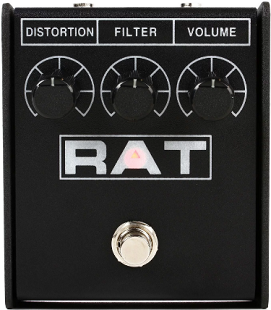Rat II
ProCo Rat II. This is today what is sold by ProCo as "The Rat". It's a chinese-made pedal and no longer uses the LM308 opamp integrated circuit (IC). This is a very common pedal as it has a good sound and because of its chinese manufacture is available for a relatively moderate price. Because of the change of country of manufacture, it's not held in the same kind of esteem as the older models, but with some choosy buying and some relatively easy parts substitutions, it's possible to make even the Rat pedals equipped with the newer OP-07 IC sound just as good as the older ones.
- Thermionic Studios has one(1) ProCo Rat II available for rental.
Doubtless by the time you're reading this, we'll have already modified the pedal to (our chosen) improved specifications. We may have even painted some of the enclosure for extra magical tone juju.
Controls

- Knob 1 - "Distortion": Adjusts the level or amount of Distortion with fully clockwise being maximum.
- Knob 2 - "Filter": This knob is a tone control that is a bit of a fluke. Unlike just about every other tone control on an amplifier, or a pedal, turning the knob fully clockwise ends up rolling OFF the high frequencies.
- Knob 3 - "Volume": Adjusts the output level with fully clockwise being maximum.
- Footswitch 1 - "On/Off": This footswitch toggles the pedal between engaged/active ("On"), and bypassed ("Off")
Bypass: True
The ProCo Rat II is true bypass by a means you may not have seen before.
It's called the Rat Bypass.
The one thing that's interesting about the true-bypass nature of the Rat is that it doesn't use a 3PDT (triple-pole dual-throw) switch, it uses a DPDT (dual-pole dual-throw) switch that is also able to entertain the feature of an LED. Most pedals have a 3PDT where one of the set of poles in the switch handles the current flow to the LED indicator. The folks at ProCo, when they looked to compete with other pedals, by adding an LED indicator, still had a huge stock of DPDT switches. ProCo handled the new requirement by continuing to use their stock of DPDT switches, but engineered a solution where the only had to an additional transistor and a couple of diodes so as to be able to add that LED without losing the true bypass switch.
The cost of an extra transistor and two diodes is far less than a whole brand new 3PDT switch.
It's a very clever arrangement you can read about here. Another interesting note about the Rat Bypass is that it prevents the effect from "popping" when you
R. G. Keen takes the Rat Bypass a bit of sophistication further and offers the Millenium Bypass for those who are interested.
General Information
From http://www.freestompboxes.org/viewtopic.php?f=1&t=13679 :
People say that the OPO7 is thinner or harsher sounding than a LM308. I think, however, that this perception may be down to the fact that a lot of the Chinese Rats have 0.0027uf instead of a 0.0033uf cap in the tone control. This will make a OPO7 Rat sound brighter at the same tone settings compared to a LM308 Rat.
If you bump the compensation cap of a OPO7 up from 33pf to a 100-150pf to compensate for the fact that the OPO7 has a faster slew rate than a LM308 then they sound pretty much the same to me.
Modifications
The newest chinese Rat II pedals have everything, including the potentiometers, mounted to the circuit board making modifications to them difficult, if not impossible. Many have suggested the You Dirty Rat as an alternative as it is still manufactured in the US (as of this writing) and because it maintains the higher-quality componentry and PCB-tracing, it is a better candidate if you're looking to modify your own Rat II. It's still possible to do this on Rat II pedals, but you're going to have to look for an older model that maintains the higher quality.
The only difference between the Rat II and the You Dirty Rat parts specifications are the clipping diodes. (Monte Allums, linked below)
Pedal Manual
Phase Inversion: Yes/No
Schematic
Artists
- Jeff Beck
- Nuno Bettencourt
- Jerry Cantrell
- Justin Chancellor
- John Christ
- Kurt Cobain
- David Gilmour
- Dave Grohl
- James Hetfield
- George Lynch
- Buzz Osborne
- Kevin Shields
- Andy Summers
- Joe Walsh
- Additional Sources
- https://www.electrosmash.com/proco-rat
- http://www.muzique.com/lab/true_bypass.htm - Explanation of ProCo Rat True Bypass
- http://www.geofex.com/Article_Folders/Millenium/millen.htm - Full explanation of Millenium Bypass
- http://monteallums.com/pedal_mods_Proco.html